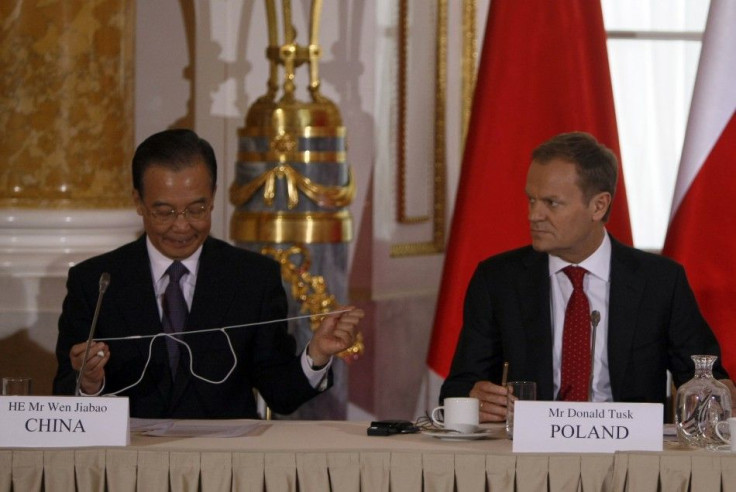Chinese Premier Hopes To Boost Regional Trade To $100 Billion With Poland Visit

China's economic relationships with Eastern Europe are deepening. Although the Asian power's trade with the former Communist bloc often goes unnoticed in the Americas, it has increased significantly in recent years.
On Wednesday, Wen Jiabao became the first Chinese premier to visit Poland in a quarter-century. On Thursday, he was greeted in Warsaw by 16 Eastern European high-ranking leaders, including prime ministers and deputy prime ministers, during only the second China-Central and Eastern Europe Business Forum ever held.
Wen expressed his hope that trade between his country and the region would double to more than $100 billion over the next three years.
According to Xinhua, Chinese trade with Central and Eastern Europe in 2001 was a paltry $4.3 billion. In 10 years, that figure had risen to $52.9 billion, a compound annual growth rate of about 28 percent.
Wen said in a speech before the regional business leaders that China would establish a $10 billion line of credit to support cooperation in infrastructure, advanced technologies, green economy, and other related projects. He also proposed setting up a China-Central Eastern cooperative investment fund, with an initial goal of raising $500 million.
Wen lavished praise on the Polish economy, saying it had successfully confronted the global financial crisis, maintained growth and financial stability. Poland's global stature and influence is continuing to rise, said Wen.
The Chinese premier also promised to create 5,000 scholarships for the region's students. Chinese bilingual language schools have already appeared in neighboring Hungary.
While small-scale Chinese businesses and imports of Chinese electronics are increasingly popular in the region, experts believe that Eastern European countries will strive to attract large-scale investments from the Chinese government on infrastructure and energy projects. Meanwhile, Chinese companies, flush with both profits and state money, are eager to use Eastern Europe as a springboard to gain market share in Europe as a whole.
In 2009, Chinese companies were awarded the right to build sections of a highway between the Polish cities of Lodz and Warsaw. This was the first time a non-European company had received a contract partly financed by European Union funds, according to the New York Times.
China's deepening economic relations with the region have been cause for both celebration and concern for locals. Analysts said the business community in the region is worried about unfair competition, product dumping, and intellectual-property issues with Chinese newcomers. Many admit there are still a lot barriers to understanding between their countries and China.
In an effort to better break through those barriers, Wen made a historic visit on Friday to the Auschwitz-Birkenau State Museum, a memorial marking the Nazi death camps once located there.
People can't embrace a beautiful future without understanding history, Wen wrote in the museum's guestbook.
Although Wen did not mention any links to China's own experiences in World War II, he offered what was perhaps a subtle reference to the country's own troubled history with Japan. The nations which waged war on others need to reflect on their history, he said. Japan and China are currently struggling with territorial disputes in the East China Sea, based on differing historical interpretations of the status of a group of small islands located between their maritime zones.
© Copyright IBTimes 2024. All rights reserved.











